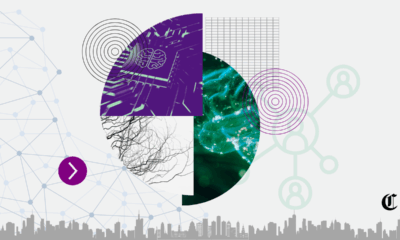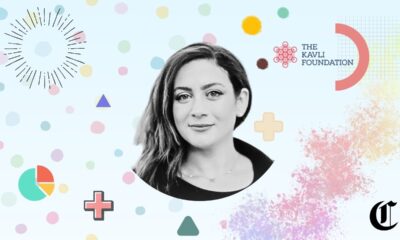Stories in Science Special Series
From Poverty to Science: Becoming a Scientist Amidst Financial Adversity
Gabriel Reyes: “Part of me wants to be angry and frustrated that no matter how hard I work or how enthusiastic I am, the socioeconomic class I was born into will be a hidden barrier.”

Gabriel Reyes
[su_boxbox title=”About”]Gabriel Reyes is a first-generation/low-income college graduate from Albuquerque, New Mexico. Driven to understand the connection between the environment, brain, and behavior, Gabriel received an Sc.B in Cognitive Neuroscience from Brown University in May 2018. During his undergrad, Gabriel was an active advocate for diversity and inclusion in science. He did a research project exploring the factors that supported underrepresented minorities (URM) pursuing careers in academia, presenting at the Humans in STEM conference at Yale University. Gabriel also created and taught “The Neuroscience of Racism,” an intensive literature review seminar that explored the neural antecedents to implicit racial bias. A Gates Millennium Scholar, Gabriel is currently at Columbia University pursuing an M.S. in Neuroscience & Education. His current research interests focus on poverty, learning, and memory in adolescence. He can be reached on twitter (@geyes1996) or by email (g.reyes0225@gmail.com). The cover photo was taken by the author outside Thomas Circle Park in Washington D.C.)[/su_boxbox]
[su_boxnote note_color=”#c8c8c8″]Story Key Points:
- It’s okay if your journey to the lab is not linear or straightforward because you cannot afford the conventional path (e.g., volunteering in labs or low-pay assistantships).
- Find mentors who understand the circumstances of your socioeconomic challenges yet continuously advocate for you to become a scientist.
- Never give up. People from impoverished backgrounds belong in the lab, too.[/su_boxnote]

Gabriel Reyes
[dropcap]T[/dropcap]his past summer, I received a call from the director of a predoctoral research program notifying me that I was matched to work with a gifted neuroscientist investigating learning & memory. It was both shocking yet affirming: this lab thought I—a queer Mexican from a poor household and the first to graduate college—was worth mentoring. The program, housed at Columbia University, would provide 2 years of intensive experience for underrepresented minorities pursuing a career in science—exactly what I needed as I pursue a Ph.D. and a career as an academic.
However, the offer came with a contingency that I literally could not afford: in order to work in the lab of my dreams, I had to drop out of graduate school.
Prior to that phone call, I had accepted an offer to enter a Master’s program at Teachers College (TC). As a Gates Millennium Scholar, this included funding for room & board—a necessary benefit for those of us who live in NYC—but not much else. Additionally, my graduate program was tailored towards professionals, so working full-time during the day was not impossible nor discouraged; both TC and Gates pushed me to work as my graduate studies would not interfere with full-time employment and both affirmed that research would be far more fruitful. Despite this, the research program made it clear that I had to choose them or graduate school—but not both.
While my peers worked on their thesis with their advisors over the summer, I took a corporate job to offset the costs of an immigration attorney for my parents.
Initially, my decision seemed simple; I agreed that despite the egregiously low pay, what I needed for a competitive graduate application was more research experience. I decided that if the tradeoff for living frugally for 2 two years would be a life as a scientist—collecting data, programming statistical models, discussing papers with other scholars in my field—then so be it.
Sadly, as I was about to take steps to leave TC, I received untimely news: my father lost his job. This was concerning for a couple of reasons: the first—my father was the primary source of income for my family (and barely made enough); the second—he is undocumented, and in our current political climate towards immigrants, I knew that securing another job would not be easy. Dropping out of TC meant relinquishing funds that could be sent home to help my parents as they adjust. Though I want to work in a neuroscience lab, my family needed me now more than ever—and these needs took precedence over my wants. So there was never a choice; my socioeconomic status had already decided my fate. In the end, I turned down the job, putting my research aspirations on hold once again.
This experience is not new to me—and certainly not foreign to many students from poor backgrounds: choosing between a lucrative profession in the name of financial stability vs a low-paying position more aligned with our passions is a recurring battle. At Brown, I worked multiple jobs instead of volunteering in a lab to help my family persevere through financial emergencies. While my peers worked on their thesis with their advisors over the summer, I took a corporate job to offset the costs of an immigration attorney for my parents.
Fortunately, the explosion of diversity & inclusion initiatives in science has generated opportunities to recruit more minorities into research than ever before. This makes me optimistic that people in science are thinking critically about who is—and isn’t—in their labs, and I trust that the scientific community is actively working to recruit minorities like myself. However, what I have noticed thus far is that these inclusive efforts have excluded a demographic that belongs in science as well: poor people.
I remember when I started looking for jobs in labs last year, many positions were offering an average of $25,000 for a full-time position—requiring a bachelor, programming experience, and other extensive training to be considered. These were also in places like Boston and San Francisco (other cities notorious for their high cost of living). In many ways, it felt that an additional, hidden requirement to become a scientist was coming from a wealthy background or being proximal to wealth.
In fact, I took a look at PhD Stipends—a website where doctoral students self-report their awards—and found that for the 2019-2020 academic year, the average stipend was $29,032. This amount is not impossible for a single person who budgets carefully and barring any complications—but life is complex: One might pay off school or auto loans; an unexpected illness arises which requires expensive medications and frequent procedures; or a family member is terminated and a family of 6 is left with virtually no income. Essentially, for a minority that comes from poverty, opting to pursue doctoral programs requires making a critical decision—for at least 5 years—to avoid financial fiascos (especially for those who don’t have access to financial safety nets).
So one of the issues recruiting more diverse bodies into academia is not solely that people are not applying—it’s also that a large percentage cannot apply. When we ask who is not in the lab, we must start asking ourselves why they are not there. Working towards a more inclusive science means actively fighting to bring people into the lab—whatever the cost—and one pivotal step to take is paying researchers more. Significantly more. Or creating safety mechanisms for financially vulnerable candidates.
Part of me wants to be angry and frustrated that no matter how hard I work or how enthusiastic I am, the socioeconomic class I was born into will be a hidden barrier. However, there is a comfort in acknowledging that the issue is not personal; this challenge is something I share with other minorities living in impoverished communities—and this is precisely what motivates my research interests.
I came to Columbia to research poverty’s impact on brain development and learning because I’m interested in researching the neural correlates of academic achievement and if differences manifest between the rich and the poor. Ideally, I hope my research leads to the creation of programs, interventions, special initiatives—anything—to advocate for a more inclusive science. Indeed, my desire to become a professor is not simply to fill in gaps of knowledge, but also to champion a more intersectional approach to diversifying science
Nevertheless, for now, I plan to continue my journey into the lab—whatever it takes—knowing that the struggles I endure will only make my success more bountiful as a result. At the very least I have my graduate program, getting one step closer to running my own lab—and when that time comes, I cannot wait to do my part to make it as diverse and inclusive as I know it can be.
Metrics
Sessions
Total number of Sessions. A session is the period time a user is actively engaged with the page.
Visitors
Users that have had at least one session within the selected date range. Includes both new and returning users.
Page views
Pageviews is the total number of time the article was viewed. Repeated views are counted.
The CS Media Lab is a Boston-anchored civic science news collective with local, national and global coverage on TV, digital print, and radio through CivicSciTV, CivicSciTimes, and CivicSciRadio. Programs include Questions of the Day, Changemakers, QuickTake, Consider This Next, Stories in Science, Sai Resident Collective and more.

-
Audio Studio1 month ago
“Reading it opened up a whole new world.” Kim Steele on building her company ‘Documentaries Don’t Work’
-
 Civic Science Observer1 week ago
Civic Science Observer1 week ago‘Science policy’ Google searches spiked in 2025. What does that mean?
-
Civic Science Observer1 month ago
Our developing civic science photojournalism experiment: Photos from 2025
-
Civic Science Observer1 month ago
Together again: Day 1 of the 2025 ASTC conference in black and white
Contact
Menu
Designed with WordPress
























